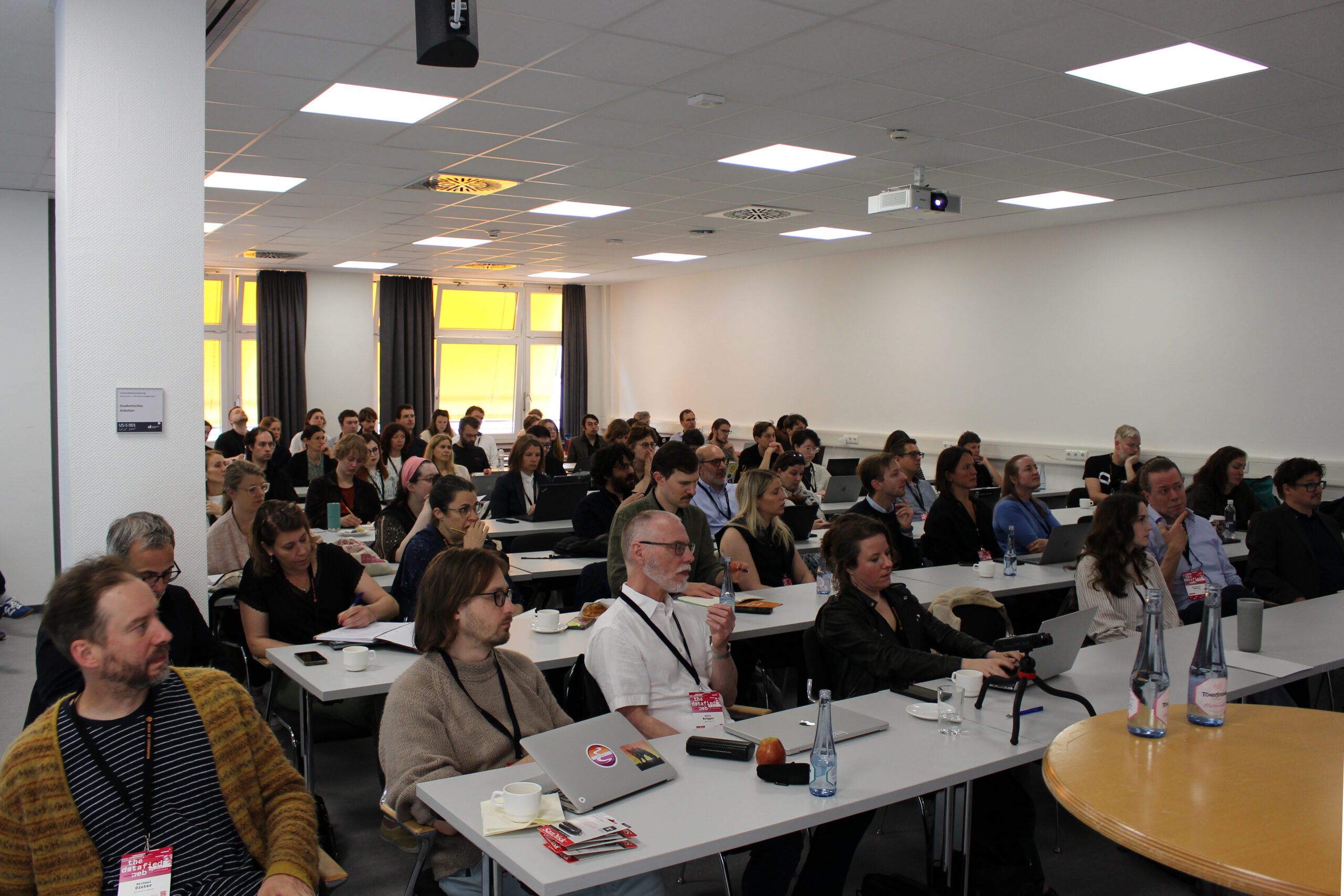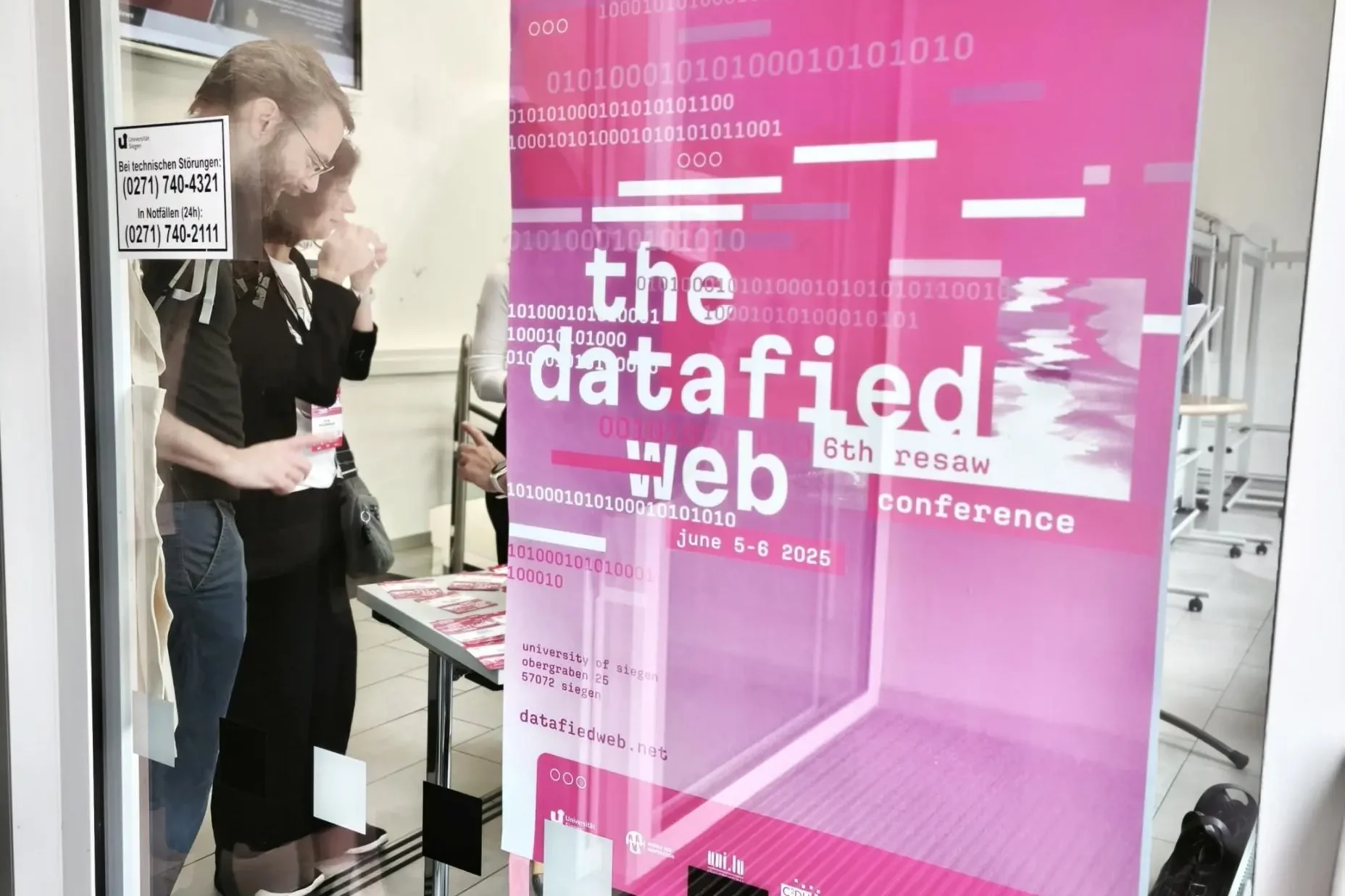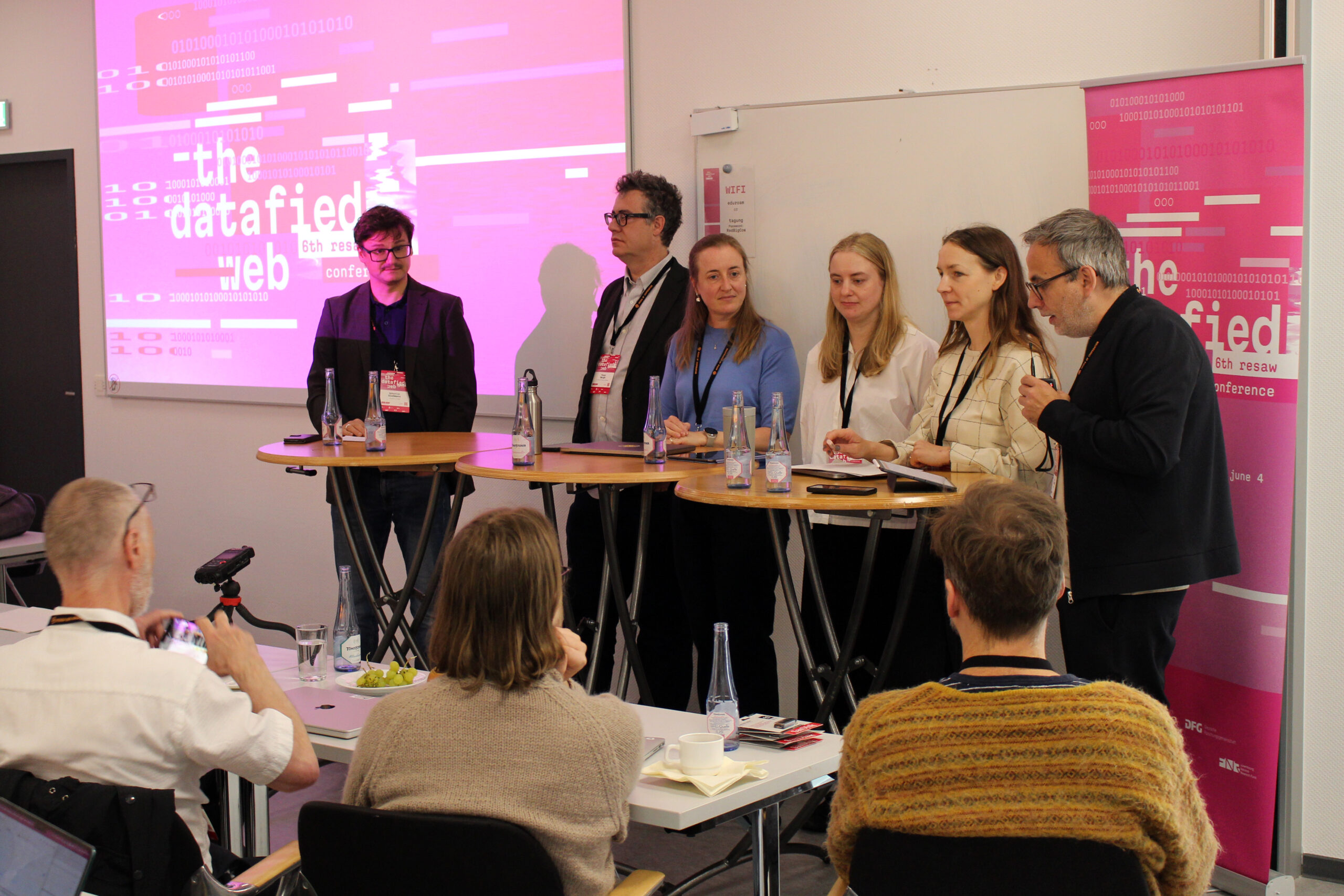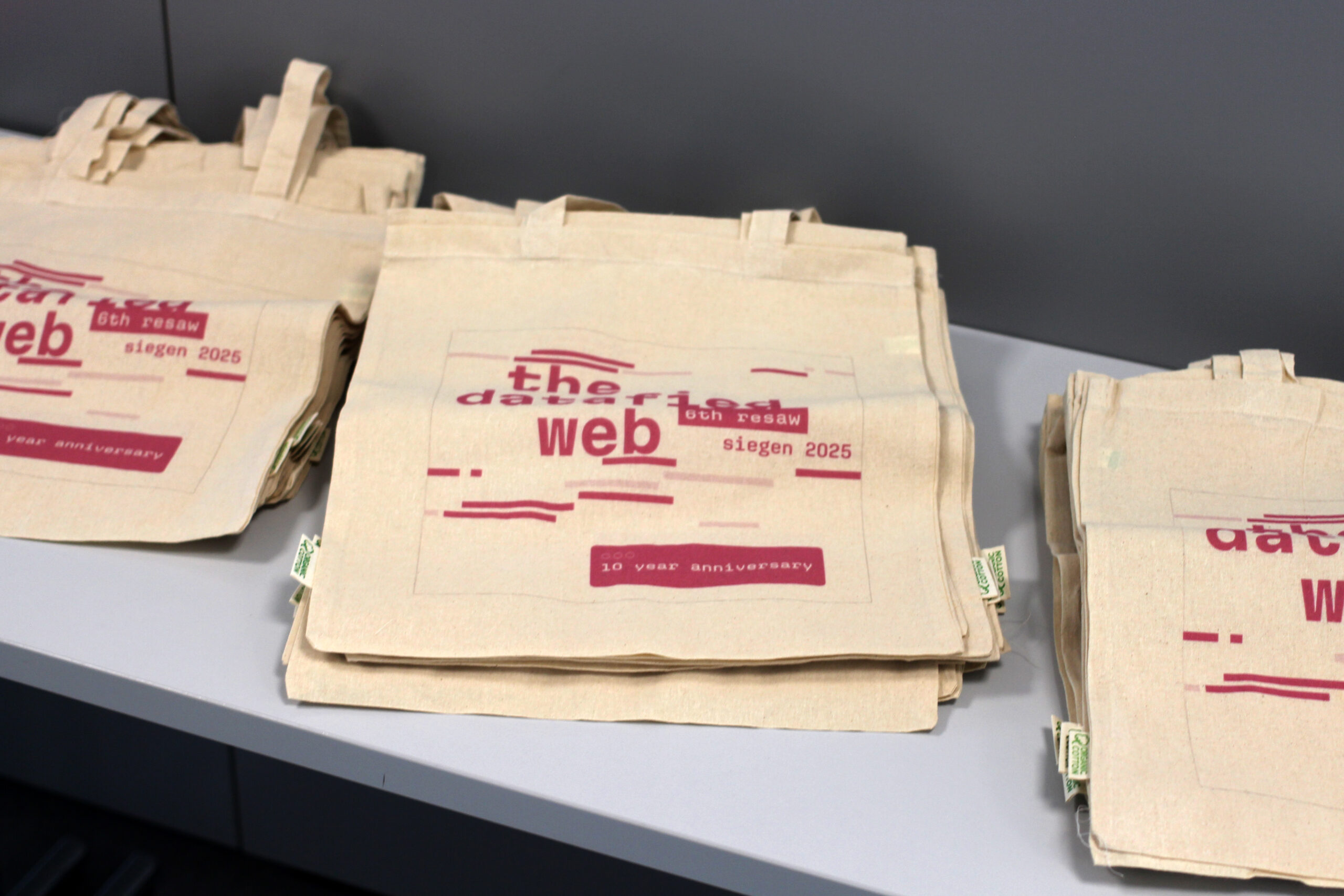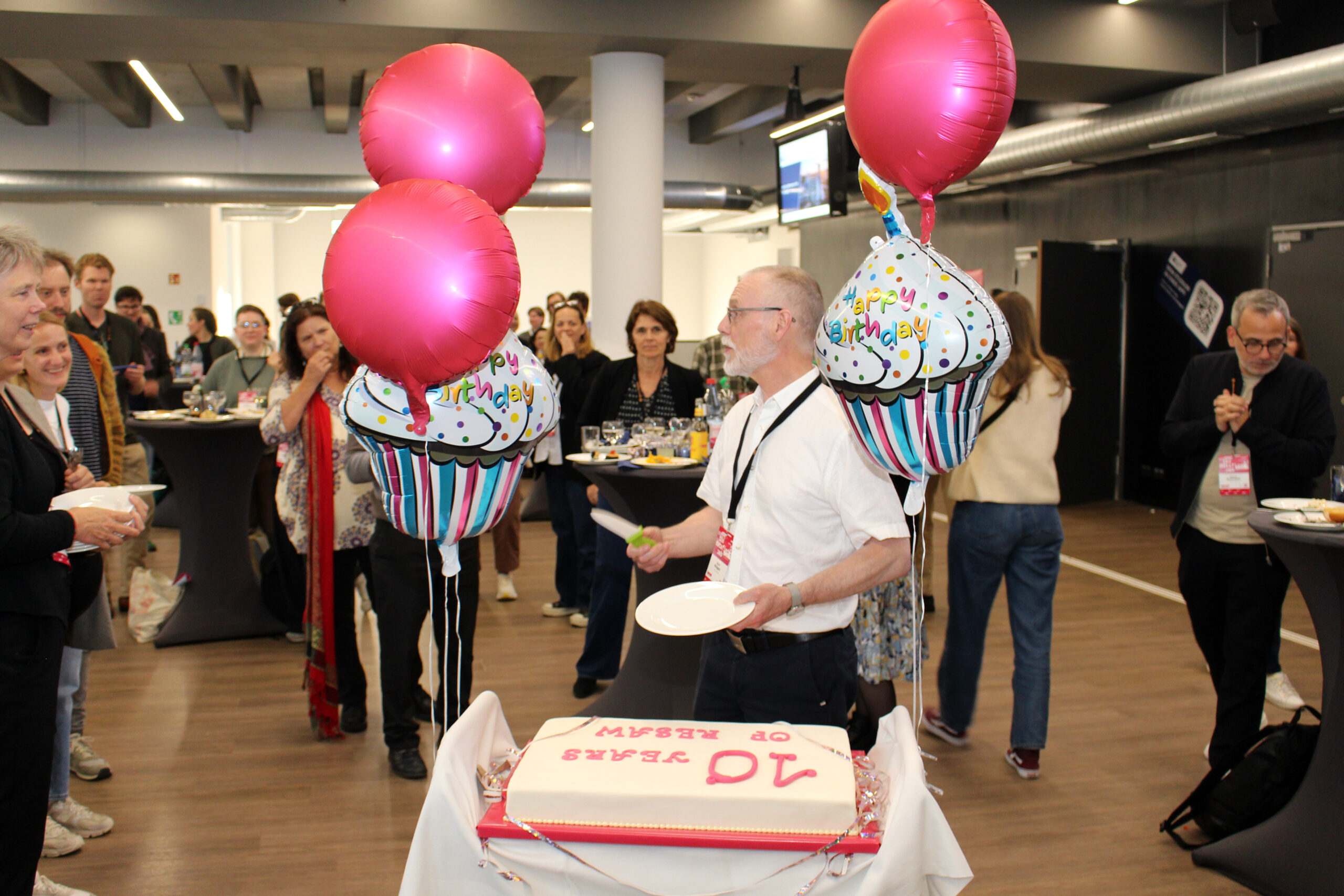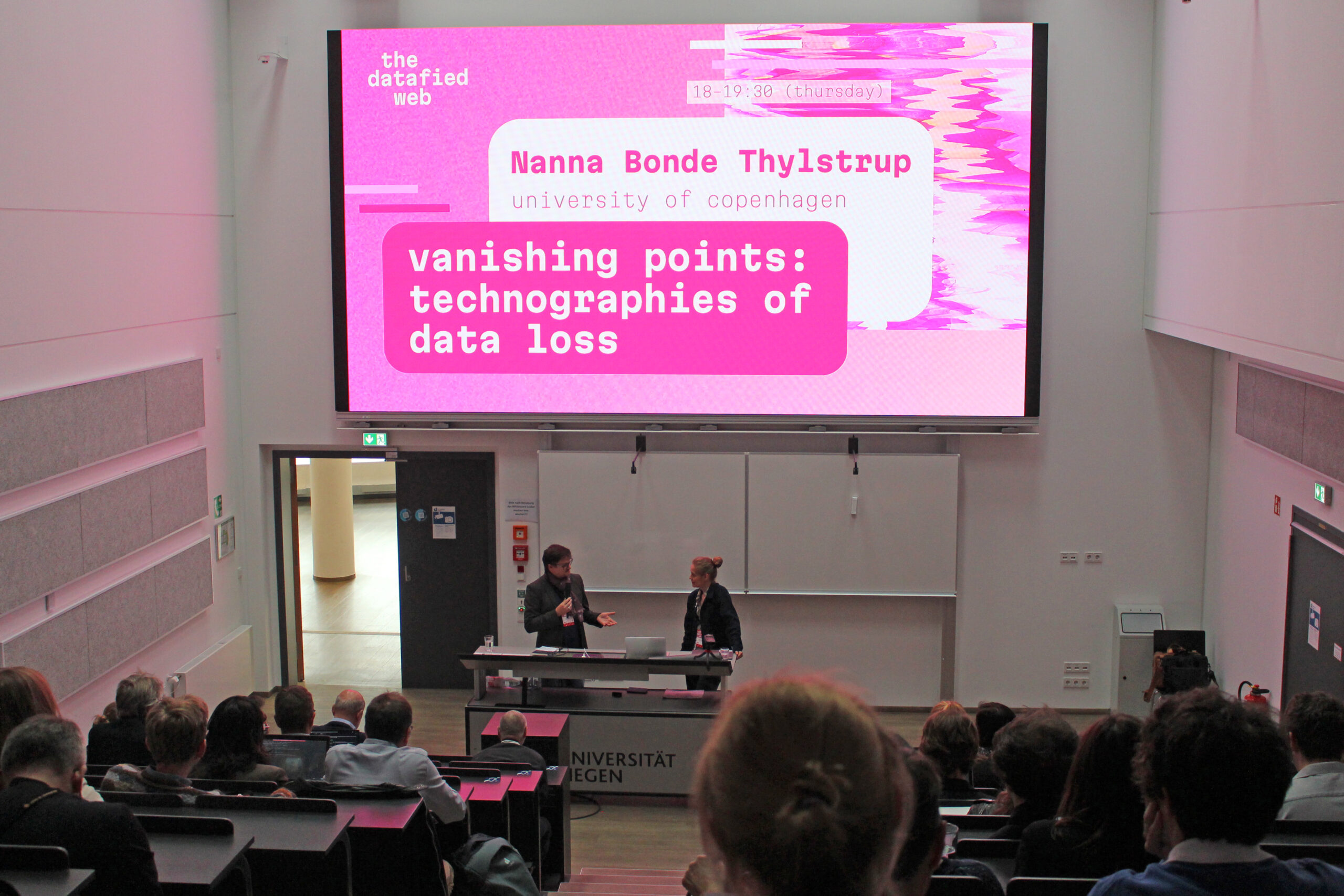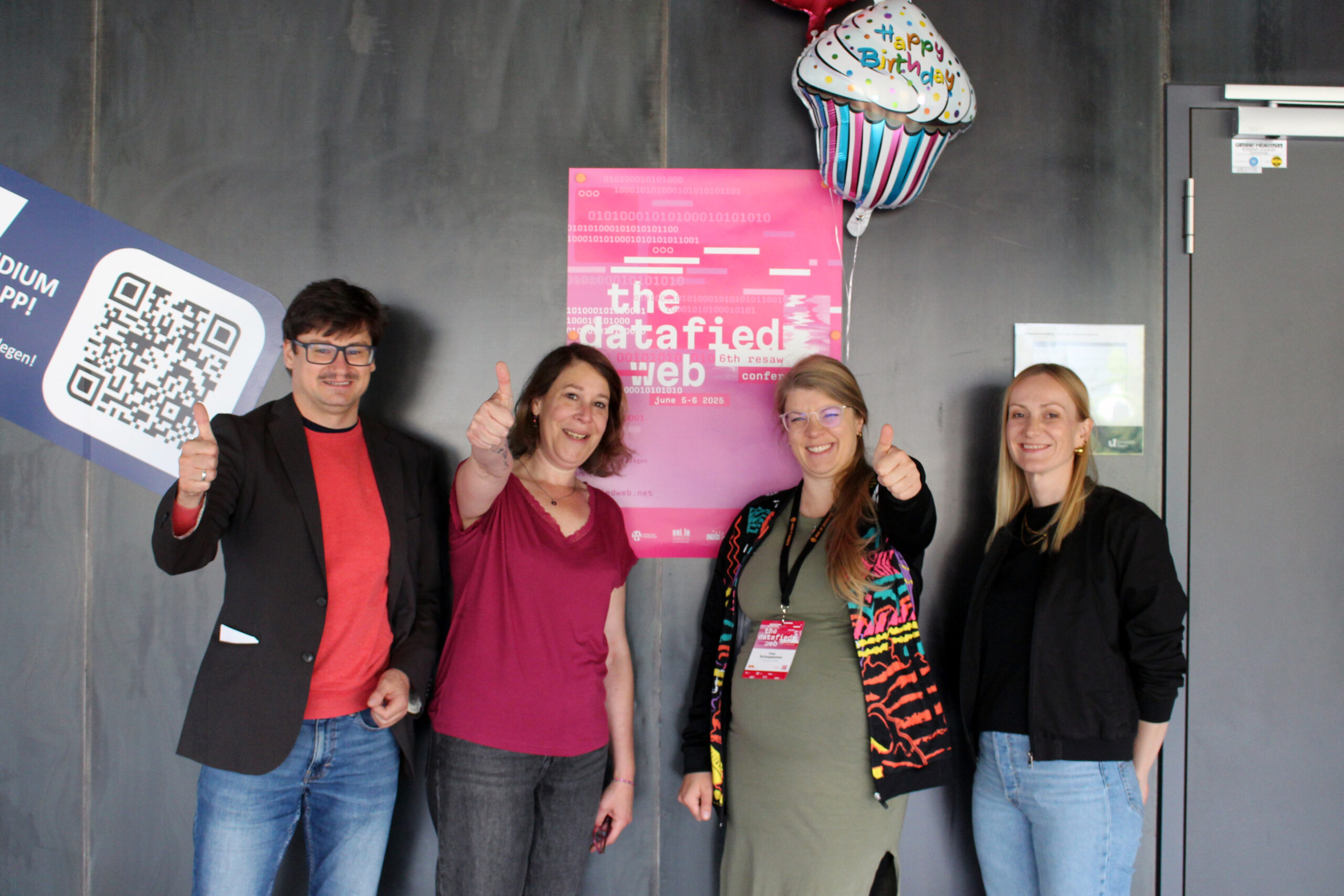News
The 2025 RESAW Conference: Data, Communities, and Food … for Thoughts
by Valérie Schafer (University of Luxembourg & CRC 1187)
The 2025 edition of the RESAW conference marked a significant milestone: the tenth anniversary of a vibrant and constantly evolving academic community. Since its inception in 2015, this conference series has brought together researchers, archivists, and practitioners from diverse fields concerned with the history and present of the web. This year’s event was memorable, not only because of the anniversary, but also due to the remarkable richness of the exchanges, the diversity of its participants, and the depth of the contributions. RESAW joined forces with the Collaborative Research Centre (CRC 1187) Media of Cooperation, both coming together to study The Datafied Web and to preserve its histories.
About the RESAW conference and community
RESAW is the acronym for A REsearch Infrastructure for the Study of Archived Web Materials. The RESAW community is dedicated to working with digital cultural heritage and gathers every two years at the eponymous RESAW conference. RESAW was founded in 2012 with the goal of building a collaborative European research infrastructure for studying and working with web materials while fostering knowledge exchange across Europe. This presents significant challenges for both research and the archiving of web-based information and objects.
RESAW 2025 – The datafied Web at the University of Siegen
The conference drew close to one hundred participants from across Europe and North America. Among them were long-standing members of the community – some of whom have attended every edition since the beginning, as well as many newcomers, and notably from the CRC team at the University of Siegen. This mix created a dynamic and productive atmosphere, with new ideas and connections flourishing. It provided intellectual renewal and disciplinary cross-pollination.
The central theme, The Datafied Web, acted as a powerful conceptual anchor, encouraging reflection on how datafication has been and is reshaping the web, our methods, and our understanding of digital studies and web archives.
While many presentations were directly aligned with the theme, the conference also remained open to a wide array of topics beyond the scope of datafication. This flexibility is a longstanding strength of the event, allowing space for discussions of current research developments, methodological experimentation, and new discoveries in the fields of web archiving and web studies. Contributions ranged from updates on national and international web archiving initiatives to exploratory studies in platform studies or qualitative and quantitative methods.
RESAW set out to trace how the datafied web became the sensory media environment we now inhabit. A web of predictive suggestion, of per-user variation, of AI-generated aesthetic and ephemeral interfaces. A web where “what you see” is a product of where you clicked, what you hovered, which model you unknowingly trained. To study this web—and to preserve its histories—that is where the research agendas of Resaw and MoC come together. (Carolin Gerlitz, spokesperson of the CRC 1187)
A significant number of talks examined The Datafied Web through historical perspectives. These included case studies on the evolution of technologies such as the CD-ROM and Bluetooth, and their interaction with or transition into web-based platforms, shedding light on the frictions and continuities involved. Others focused on pressing current concerns, such as data surveillance, algorithmic governance, and the political economy of web and platform infrastructures.
The datafication of the web has brought about a decisive transformation of capitalism – and capitalist economies have in turn datafied the World Wide Web. Our current platform economies are based on the historical development of cookies, web advertising, and the measurement of public data. (Sebastian Gießman, head of the conference)
The interdisciplinary character of the conference was particularly evident this year. Approaches drawn from Web and Platform Studies, the History of Technology, Archival Studies, Digital Humanities, and Critical Data Studies were all present, and in fruitful dialogue. This interdisciplinarity was reflected not only in the themes discussed, but also in the methods employed: from close analysis to distant and scalable reading, and from infrastructure-focused studies to content-based investigations. Such methodological diversity illustrates the richness of the field and the necessity of hybrid approaches to fully grasp the complexities of the web’s past, present and future.
The keynote addresses were among the highlights of the conference. Nanna Bonde Thylstrup’s keynote offered a historically grounded presentation on the theme of data loss, linking it to broader narratives of memory, preservation, and forgetting in the digital age. Jonathan Gray’s keynote, by contrast, was more oriented toward the present and near future, addressing the stakes of open data, and the role of researchers in shaping ethical and inclusive data practices.
Beyond the formal sessions, a variety of pre-workshops, social events, and targeted meetings enriched the experience. Early-career researchers were given space to receive feedback and engage in mentoring dialogues. Pre-conference workshops offered hands-on methodological training and collaborative problem-solving. Roundtables tackled timely and strategic questions, such as the future of our scholarly RESAW network, and the challenges of studying datafication in the opening roundtable. (A personal conference trip report by Lesley Frew that focuses on her experience and some of the sessions is also available).
Of particular note was the attention paid to the epistemological and methodological implications of working with web data. Whether focusing on the politics of web archiving, the limits of data transparency, or the possibilities of algorithmic critique, many sessions interrogated not only what we know, but how we come to know it and what remains excluded or erased in the process. Case studies drawn from diverse geographical, historical and linguistic contexts further enriched these discussions, reminding us of the web’s heterogeneity and the need for grounded, situated and reflexive perspectives.
In conclusion, the 2025 conference was more than just a commemoration of ten years of scholarly exchange and conferences. It was a powerful reaffirmation of the value of community, dialogue, and interdisciplinary collaboration in the face of a rapidly evolving digital landscape and more generally world. The themes explored, the connections made, and the questions raised will no doubt continue to inspire work in the years to come.
We would like to sincerely thank again all the local organisers, all the participants who made this edition such a success, as well as the DFG and FNR, the University of Siegen, the CRC Media of Cooperation, and the C2DH at the University of Luxembourg for their support to this event.
The 2025 RESAW conference was organized by the Collaborative Research Centre 1187 “Media of Cooperation” at the University of Siegen in cooperation with the Centre for Contemporary and Digital History (C²DH) at the University of Luxembourg. The conference is funded by the Deutsche Forschungsgemeinschaft (DFG, German Research Foundation) and the Luxembourg National Research Fund (FNR).
More
Press release by the University’s Press Office →
Conference report by Lesley Frew →
The CRC grants two scholarships
The CRC awards two short-term scholarships to promote the work of early-career researchers who are conducting research in the field of digital media, sensing and sensor technology, data practices and AI and are interested in a longer-term collaboration with the CRC.
Info
- duration: 9-12 months
- The basic amount of the scholarship is based on the maximum rate of the DFG (1.365,- EUR). In addition, an allowance for material expenses and, if applicable, a child allowance will be paid.
- Basic amount of the scholarship: EUR 1,365 (maximum DFG rate)
- Material cost allowance and, if applicable, child allowance are paid in addition
About the CRC 1187 “Media of Cooperation“
The CRC is an interdisciplinary collaborative research centre consisting of 19 subprojects and more than 60 researchers from media studies, ethnology, sociology, computer science, linguistics, ubiquitous computing, science and technology studies, education, law and engineering.
The Collaborative Research Centre 1187 has been funded by the German Research Foundation (DFG) since 2016. The research centre studies digital media, which have emerged as cooperative tools, platforms and infrastructures on a broad front, and approaches them as cooperatively accomplished means of cooperation. In the first funding phase (2016-2019), the CRC focused on the relevance of social media and platforms, while the second phase (2020-2023) centered on data-intensive media and data practices. Phase 3 (2024-2027) inquires the interplay between sensor media and artificial intelligence.
The short-term fellowship program of the CRC provides national and international doctoral students the opportunity to further develop their research project in the CRC, to get to know participating researchers and to exchange ideas with them. The research projects of the scholarship holders should be thematically related to the subprojects of the CRC, so that their work can be supported by the principal investigators and their teams. Scholarship holders are assigned to the Integrated Research Training Group (MGK) of the CRC and benefit from its structured training program. The CRC offers scholarship holders an international environment for interdisciplinary media research as well as an extensive program of events and training in ethnographic, digital, sensor-based, linguistic, and AI-based methods.
Further information on the CRC’s research agenda and subprojects can be found at https://www.mediacoop.uni-siegen.de/en.
Your Profile
- Relevant, above-average degree in one of the disciplines participating in or related to the CRC, preferably in media and cultural studies, sociology or in the field of socio- or business informatics, human-computer interaction or information systems (equivalent to a Master’s degree, Magister, Diplom or Lehramt/Staatsexamen Sek. II)
- Individual research project in one of the above-mentioned disciplines within the subject area of the CRC. Ideally, you can assign the project to one of the subareas of the CRC: infrastructures, publics, or sensory praxeology
- Interest in methods of media research, the analysis of data practices and an affinity for working in an interdisciplinary research environment
- Willingness to participate in the international event program of the CRC and the MGK
- Very good written and spoken English language skills
Your Tasks
Expectations of successful candidates:
- Regular participation and involvement in the events and the training program of the MGK (colloquia, workshops, summer schools, methodology workshops, interdisciplinary groups)
- Presentation of preliminary results of the individual research project within the MGK colloquium
About the application
Please send your application documents (letter of motivation, curriculum vitae, copies of certificates, 5-10-page outline of a project idea) as a single PDF file (max 5 mb) to dominik.schrey@uni-siegen.de by 25 June 2025. Please note that risks to confidentiality and unauthorized access by third parties cannot be ruled out when communicating by unencrypted e-mail.
About the University
The University of Siegen is an interdisciplinary and cosmopolitan university with currently around 18,000 students and a range of subjects from the humanities, social sciences and economics to natural sciences, engineering and life sciences. With over 2,000 employees, we are one of the largest employers in the region and offer a unique environment for teaching, research and further education.
Equal opportunities and diversity are promoted and actively practiced at the University of Siegen. Applications from women are highly welcome and will be given special consideration in accordance with the federal state equality law. We also welcome applications from people with different personal, social and cultural backgrounds, people with disabilities and those of equal status.
Information about the University of Siegen can be found on our homepage: www.uni-siegen.de.
For further information, please contact
Dr. Dominik Schrey
Phone: +49 (0) 271 740-4664
E-Mail: dominik.schrey@uni-siegen.de
Synthetic Imaginaries: The Cultural Politics of Generative AI

University of Siegen | 8–12 September 2025 | extended deadline for submision: 30 June 2025
Synthetic Imaginaries: The Cultural Politics of Generative AI is an international event that will explore the cultural, political, and methodological dimensions of generative AI and synthetic media through a combination of conference talks, hands-on workshops, and collaborative projects. Topics include deepfakes, avatars, cultural biases in training data, feminist and postcolonial critiques, and the aesthetics of AI-generated content.
About | Program Highlights | Proposal Submission | Venue | Program | Contact
About the Autumn School
The rise of artificial intelligence (AI), big data processing, and synthetic media has profoundly reshaped how culture is produced, made sense of, and experienced today. To ‘synthesize’ is to assemble, collate, and compile, blending heterogeneous components into something new. Where there is synthesis, there is power at play. Synthetic media—as exemplified by the oddly prophetic early speech synthesizer demos—carry the logic of analog automation into digital cultures where human and algorithmic interventions converge. Much of the research in this area—spanning subjects as diverse as augmented reality, avatars, and deepfakes—has revolved around ideas of simulation, focusing on the manipulation of data and content people produce and consume. Meanwhile, generative AI and deep learning models, while central to debates on artificiality, raise political questions as part of a wider social ecosystem where technology is perpetually reimagined, negotiated, and contested: What images and stories feed the datasets that contemporary AI models are trained on? Which imaginaries are reproduced through AI-driven media technologies and which remain latent? How do synthetic media transform relations of power and visibility, and what methods—perhaps equally synthetic—can we develop to analyze these transformations?
The five-day event at the University of Siegen—organized by the DFG-funded Collaborative Research Centers Media of Cooperation and Transformations of the Popular together with the Center of Digital Narratives in Bergen, the Digital Culture and Communication Section of ECREA and the German National Research Data Infrastructure Consortium NFDI4Culture—explores the relationship between synthetic media and today’s imaginaries of culture and technology, which incorporate AI as an active participant. By “synthetic,” we refer not simply to the artificial but to how specific practices and ways of knowing take shape through human-machine co-creation. Imaginaries, in turn, reflect shared visions, values, and expectations—shaping not only what technologies do but how they are perceived and made actionable in everyday life.
The event opens with a one-day conference and moves into hands-on workshops and collaborative projects. With multiple opportunities for exchange across disciplines, we encourage especially early-career researchers and PhD students to present their ideas during the conference and join a project led by international facilitators and data designers. We invite submissions of short abstracts (max. 500 words) for presentations engaging with questions and provocations related—but not limited—to topics such as:
Critical data studies perspectives on AI: how data infrastructures, labeling, and curation shape the outputs we call “synthetic”; Cultural afterlives of training data: how racialized, gendered, or colonial imaginaries persist in synthetic media outputs; Methodological uses of GenAI: the politics that we buy in when repurposing AI as a method, from inherited bias to epistemic tensions; Synthetic personhood and likeness: exploring deepfakes, AI-generated avatars, and the power of (in)authenticity; Online cultures and platforms: how AI-generated content circulates across platforms—from memes and art to fan fiction, music, and poetry; Postcolonial and feminist critiques of AI: challenging universalist assumptions in generative models and interrogating whose knowledge is made (in)visible; Clichés, formulas, and repetition in GenAI outputs: how AI-generated stories and images rely on familiar tropes, visual styles, and narrative conventions; The aesthetics of noise in AI-generated content: repetition, glitch, randomness, and their role in producing or disrupting meaning; GPTs as infrastructural components: how generative pretrained transformers operate as configurable, customizable, and task-oriented agents embedded in platform infrastructures; Prompting and/as probing: prompting as a form of critical intervention, shaping co-authorship, sense-making, and research design; The ethics of training AI: from historical records and religious texts to indigenous cosmologies and oral traditions—what are the implications of using culturally sensitive knowledge to train generative models? Generative AI and Memory: synthetic media as a means of reimagining the past—through deepfake testimonies, interactive historical simulations, and other forms of computational memory-making; Generative AI in activist contexts: can AI be used for resistance or reimagining community—in the face of its environmental footprint and complicity in extractive systems?
Program highlights
The event blends three complementary formats:
Mix questions!
Monday, 8 September
Day one begins with a keynote by Jill Walker Rettberg and opens space for emerging questions—think of it as an idea hub. Accepted abstracts will be grouped into thematic sessions curated by the organising team. Presenters will be connected via email ahead of time to coordinate their contributions. Each presentation will be set to 10 minutes to allow ample time for discussion, collective thinking, and exchange. The emphasis is on dialogue, not polished conclusions.
Mix methods!
Tuesday, 9 September-Thursday, 11 September
The next three days—featuring a workshop by Gabriele De Seta and an artistic intervention by Ángeles Briones and DensityDesign Lab—are about exploring new methods—hands-on! We invite you to join a team of interdisciplinary scholars and data designers in probing new methodological combinations. Each of our project teams will present a research question alongside a specific method to be collaboratively explored. Participants will not only learn how to design prompts and work with AI-generated text and images but also how to critically account for genAI models as platform models. All projects draw on intersectional approaches, combining qualitative and quantitative data to explore the synthetic dimensions of AI agency—whether as content creator, noise generator, hallucinator, research collaborator, data annotator, or style imitator. Please bring your laptops. The project titles will be announced soon.
Synthesize!
Friday, 12 September
The final day is dedicated to sharing, reflecting, and synthesizing the questions, methods, and insights developed throughout the week. Project teams will present their collaborative processes, highlight key takeaways, and discuss how their ideas and approaches shifted through hands-on experimentation with methods.
Proposal Submission
Please submit your proposal (max. 500 words) outlining how your work aligns with the event’s theme by 30.06.2025, using this form. Please note that the number of participants will be limited to maintain focused and engaging discussions. All submissions will be peer-reviewed.
The event is free of charge, though attendees are responsible for arranging and covering their travel and accommodation in Siegen. Limited travel support is available (two to three stipends ranging from €500 to €700). Early-career researchers and PhD students are invited to apply; stipends will be awarded by the NFDI4Culture consortium based on the strength of the justification, particularly concerning critical ethical engagement with AI research data, as well as the distance and cost of travel. Short summaries of the presented work will be published on the NFDI4Culture website.
A certificate of participation will be issued for both the conference presentation and the hands-on workshop sessions.
Updated Timeline with extended deadline:
Submit your proposal by 30 June 2025.
Notification of acceptance by July 15 2025.
Registration by August 1 2025.
Venue
Universität Siegen
Campus Herrengarten
AH-A 217/18
Herrengarten 3
57072 Siegen
Contact
Dr. Elena Pilipets
elena.pilipets[at]uni-siegen.de
ecreadigitalculture[æt]gmail.com
The Autumn School is organized by the DFG-funded Collaborative Research Centers 1187 Media of Cooperation and 1472 Transformations of the Popular together with the Center of Digital Narratives in Bergen, the Digital Culture and Communication Section of ECREA and the German National Research Data Infrastructure Consortium NFDI4Culture.
The datafied Web
Do you remember…
… the beginnings of the internet in the 90s?
… the birth of web counters?’
… those digital pioneers who started to track our online activities?
… the novelty of seeing website visits measured in real-time?
… eye-catching graphics becoming the currency of our online attention?
… the early days of companies like Webtrends, Urchin and DoubleClick?
More than 40 presentations by over 70 researchers from 11 countries shape the program of the RESAW 2025 conference, focusing on early web development and tracing the historical roots of data-driven web tracking. The conference will take place on June 5 & 6 at the Collaborative Research Center 1187 “Media of Cooperation” in Siegen.
About the RESAW conference and community
RESAW is the acronym for A Research Infrastructure for the Study of Archived Web Materials. The RESAW community is dedicated to working with digital cultural heritage and gathers every two years at the eponymous RESAW conference.
RESAW was founded in 2012 with the goal of building a collaborative European research infrastructure for studying and working with web materials while fostering knowledge exchange across Europe. This presents significant challenges for both research and the archiving of web-based information and objects.
RESAW 2025 – The datafied Web at the University of Siegen
Over the last two decades the Web has become an integral part of European society, culture, business, and politics. However, web content disappears rapidly—the average lifetime of a web page is two months. To provide future access to this increasingly important digital cultural heritage, key research infrastructures in the form of national Web archives have been established in several European countries.
A web archive is a collection of web material that was born online. However, for the researcher who wants to study values and lifestyles, views and beliefs, identities and cultures across European borders, these national Web archives become an obstacle since they delimit the borderless flow of information on the internet with national barriers. High-quality research across borders requires free and efficient cross-border researcher access to national Web archives. To meet this need, RESAW will establish and operate a collaborative world-class trans- national European research infrastructure that enables cross-border studies of the archived Web by integrating and opening up existing Web archives.
RESAW mobilises a comprehensive consortium of partners, including the national Web archives of Denmark, France, the Netherlands, Portugal and the UK, and the US-based Internet Archive, as well as six research institutions and one specialist consultancy company from six different Member States.
RESAW is in line with the EU’s ambitions expressed in The Digital Agenda for Europe, and it will provide services that do not exist today, putting Europe at the forefront in this field. By facilitating easy access to large amounts of cultural heritage, Big Data, and searching, selecting, and analysing the material, RESAW will make the research process more efficient and enhance the European Research Area. It is thus expected to have a transformative impact on a wide range of researchers who want to use material from national Web archives other than their own.
The sixth RESAW conference is dedicated to tracing the historical roots of the data-driven paradigm in web development. It closely examines trends, trajectories, and genealogies of a datafied and metric-driven web, as well as the rise of platform-based ecosystems. Investigating the historical context, aesthetics, and role of web counters, analytics tools, mobile sensors, and other metrics can contribute to a deeper understanding of online interactions, past publics and audiences, and their (at times problematic) developments.
The theme “The Datafied Web” also raises questions about methods and (web) archives that enable the study of this transformation: What challenges and methodologies arise in archiving a metrified and increasingly mobile web, including its back-end infrastructure? Additionally, the theme invites an exploration of the historical development of data collection and the evolution of web-based data monitoring practices. Related topics include the historical trajectories of tracking mechanisms, cookies, and the emergence of digital footprints, as well as the evolution of metric-dependent businesses and the financialisation of web spaces and their implications.
Taking a historical web analysis perspective, the conference examines mediated environments and asks: How has the datafied web shaped the sensory media environments in which we live today?
Highlights of RESAW 2025
To mark the 10th anniversary of the RESAW conference, a panel discussion organized by Niels Brügger will take place. Be sure to save the date: Friday afternoon, June 6.
A special highlight of this year’s conference are the keynote lectures on Thursday evening and Friday morning, delivered by Nanna Bonde Thylstrup, Associate Professor in Modern and Digital Culture at the University of Copenhagen, and Jonathan Gray, Reader in Critical Infrastructure Studies at the Department of Digital Humanities, King’s College London. Nanna Bonde Thylstrup will speak on “Vanishing Points: Technographies of Data Loss”, approaching the critical study of disappearance through the development of a technographic approach. Jonathan Gray will deliver a keynote on “Public Data Cultures”, historicizing the legal and technical conventions of open data.
Both keynotes aim to take a fresh look at the concept and practices of data: Web data is cultural material, a medium of participation and a site of transnational coordination.
A total of 22 panels at RESAW 2025 will feature over 70 presentations from researchers based in Siegen and across the international RESAW network—including participants from Luxembourg, the Netherlands, France, the United Kingdom, Sweden, Denmark, Belgium, the United States, Portugal, and Israel. On Thursday, panels will shed light on platforms and social media, monetization and web archiving practices, and dealing with data loss, among other topics. On the second day, the focus will be on the Skybox research programme, the history of platforms and research methods.
The conference promises insightful discussions on current research questions related to the trends, trajectories, and genealogies of a datafied and metric-driven web. It will also foster critical dialogue on the challenges and opportunities posed by the rise of platform-driven ecosystems.
The 2025 RESAW conference is organized by the Collaborative Research Centre 1187 “Media of Cooperation” at the University of Siegen in cooperation with the Centre for for Contemporary and Digital History (C²DH) at the University of Luxembourg. The conference is funded by the Deutsche Forschungsgemeinschaft (DFG, German Research Foundation) and the Luxembourg National Research Fund (FNR).
How “smart” is your home?
A research study by Stephan Habscheid, Dagmar Hoffmann, Tim Hector, Niklas Strüver, (all University of Siegen, SFB 1187)
The project team of B06 “Un/desired observation in interaction” is looking for participants for a research study on “smart homes”. Do you have smart home devices, or want to buy new smart home devices soon? Then consider participating in this study.
→ To the website of project B06

About the study
We want to investigate ‘smartness’ in your everyday life. To gain insights into everyday life with smart devices in general, we would like to accompany and record you as you set up or use your smart home devices. We use the results and data exclusively for research purposes. The data collected will be processed confidentially following the highest data protection standards. In publications, strict anonymization or obfuscation of the participants is ensured.
For the study, we are looking for
- households with smart speakers, smart kitchen appliances (e.g. a Thermomix), networked electronics (e.g. light bulbs, thermostats, door locks or sockets), digital energy controls for a solar panel or similar devices/applications
- households that do not use such devices yet but are planning to purchase them and would let us accompany them in setting up and using them.
In case you want to participate, we will offer you an expense allowance of between 30 and 180 euros, depending on the extent of your participation.
Participation involves:
- The video recording of the use of smart home devices in certain situations, e.g. when cooking and playing games, during everyday conversations or when friends and acquaintances visit.
- If possible, video recording of the initial setup of smart home devices (unpacking, installation, connecting to the smartphone and placement in the home).
- The recording of all smart home applications in your home as well as various interviews with you and other household members.
- Screen recording will also be carried out in certain situations to determine the connection between the smart home device and your smartphone.
Cameras and audio recording devices will be provided by us.
Participation requirements: All members of your household must be at least 16 years old.
Contact
If you have any questions, please send an e-mail to the project team: ipa-studie[æt]uni-siegen.de.
„digital:gender – de:mapping affect. a speculative cartography”
edited by Julia Bee (Ruhr-University Bochum), Irina Gradinari (Fernuniversität Hagen) and Katrin Köppert (Academy of Fine Arts Leipzig)
How do digital objects influence our critical thinking when they affect our emotions? Julia Bee explores this question together with colleagues in the publication digital:gender – de:mapping affect. a speculative cartography, published in 2025.
About the book
The publication looks at the intersections that now exist between gender studies and the objects of digital media culture—memes, apps, posts. Speculative experiments are carried out to test out entry points to the contemporary constellations of digital media culture and gender theory approaches using individual objects. Feeling and affect play a key role here: having our emotions appealed to by artistic and media objects changes our critical thinking about them. The “cartography” of contemporary digital media culture thus constitutes a situated method.
About the Author
Julia Bee is a professor of Gender Media Studies at Ruhr-University Bochum, with a special focus on diversity. In her research, she focuses on intersectional approaches and gender media theory. She leads the projects B09 “Bicycle Media. Cooperative Media of Mobility” and Ö “Public Relations: Cooperative Research and Design” at the Collaborative Research Centre.
Irina Gradinari is Junior Professor of Gender Studies at FernUniversität in Hagen. Katrin Köppert is Junior Professor of Art History/Popular Cultures at the Academy of Fine Arts Leipzig.
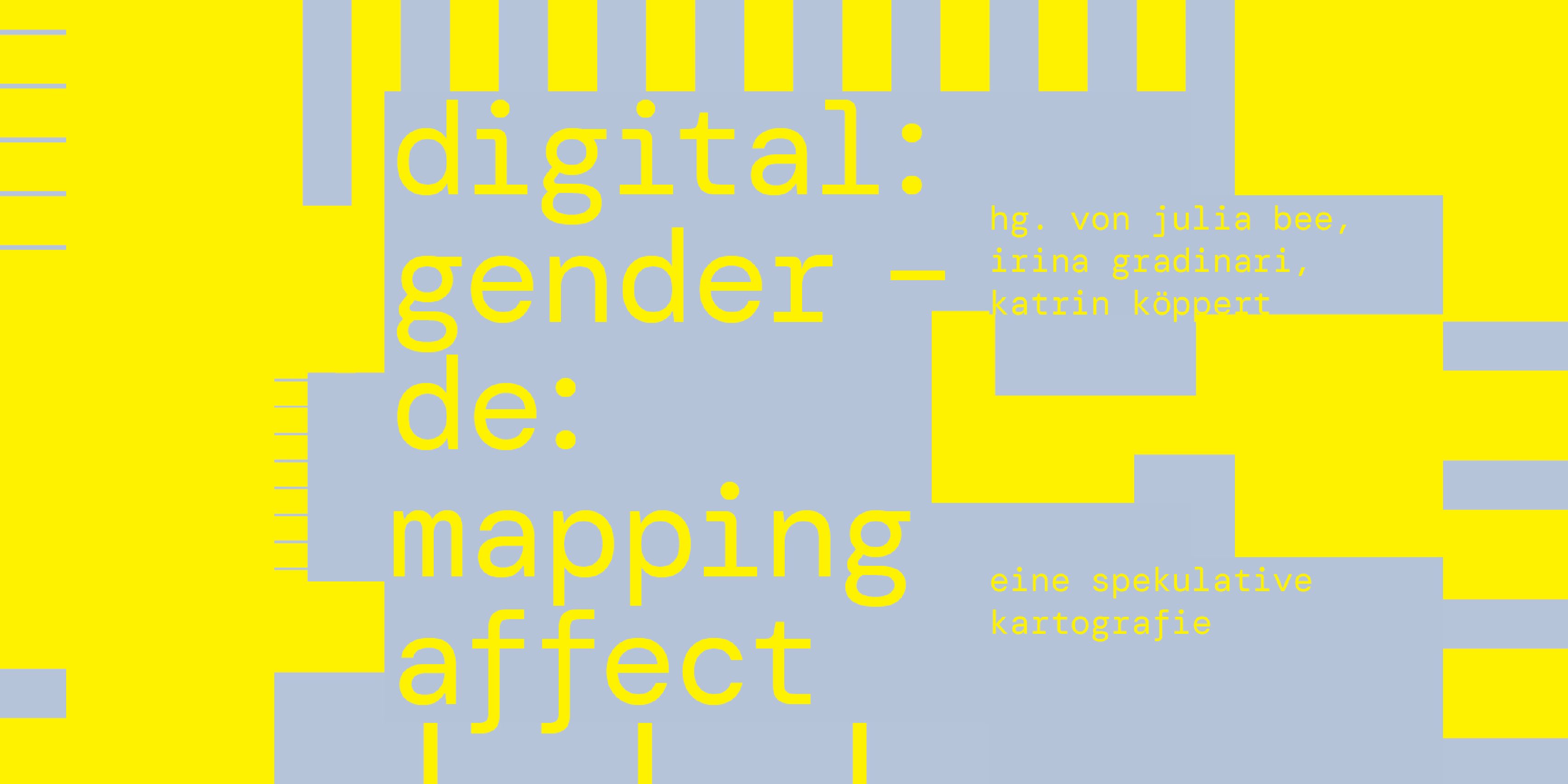
Knowledge, transfer and partners in research and public engagement
What is the role of Researchers in local, regional and national innovation ecosystems? Our training series discusses new ways and methods to engage with stakeholder and reflect on the impact our research might have. All parts will be lead by city2science.
About the workshop series
Openness, transparency and the ability to communicate with diverse audiences inside and outside academia are key competences in 21st century research and innovation. Transferrable skills in the areas of science communication and public engagement are increasingly relevant for academic and non-academic career paths, as well as for the acquisition of national and international funding. The interdisciplinary and interactive training series invites researchers to gain practical skills in science communication and public engagement. The course will empower researchers via a mix of input, reflections and practical sessions. A major goal of the training will be to enable participants to develop a communication plan related to (their individual) research topics and to communicate their key messages to diverse audiences in a clear and effective way.
Part #1: Start the Dialogue, Open Up Science! – Introduction to Science Communication and Public Engagement
-
Current developments in science communication and public engagement
-
Key concepts in science communication
-
Identification of potential target groups and stakeholder
-
Reflecting roles and responsibilities of researchers in science communication
-
Clarification of individual needs in science communication
Part #2: Open Science and Open Innovation in Science Communication
-
Open Science and Open Innovation as a collaborative approach to research and development
-
Development of external collaborations and broader networks of stakeholders, including other researchers, industry experts, customers, and multiple publics outside academia
-
Integration of open innovation practices into own research processes
-
How to approach new and relevant stakeholders and how to engage in open innovation processes
-
Discussing benefits and challenges associated with Open Science and Open Innovation
-
Discovering the innovation potential of your own research
Part #3: Communication Strategies and Pathways to Impact
-
How to plan strategic communication and engagement activities related to (individual) research topics
-
Develop skills and get to know concrete tools for clearly communicating research to target audiences and potential stakeholders
-
Introduction to “Challenge- and Impact-Driven” research and communication
-
Measures to maximize impact: Communication, dissemination and exploitation strategies
-
Using different communication tools with a focus on Social Media, e.g. how to create a research(er’s) profile on Social Media
Part #4: Stakeholder Engagement and Engagement Formats
-
Basic understandings of research with and for society
-
From information to collaboration: Ways to engage multiple publics with research
-
Develop concepts and initial strategies for research projects
-
Learn how to plan strategic communication and engagement activities related to research
-
Concrete tools to clearly communicate research results to the respective target groups and potential stakeholders
-
Innovative approaches and formats for science communication including ideas for creative event formats
About city2science
city2science supports strategic alliances between city and campus and develops innovative formats of science communication.
city2science offers individual consulting services for universities and research institutions as well as cities, municipalities and regions, including consulting and application development, especially in European funding programs
city2science has internationally recognized expertise in the theory and practice of science communication and public engagement. Based on many years of experience in theoretical reflection as well as in the practical implementation of innovative strategies and formats of science communication, city2science offers a comprehensive range of services in this permanently evolving future field.
Wie gestalten wir den digitalen Euro als neues Medium der Kooperation?
Mit Sebastian Gießmann (Universität Siegen. SFB 1187) und Petra Gehring (TU Darmstadt)
Sebastian Gießmann und Petra Gehring diskutieren am 26. Mai auf der diesjährigen re:publica über den digitalen Euro, seine Zukunft und Kontroversen. Das re:publica Festival widmet sich Themen der digitalen Gesellschaft.
Über den Beitrag
2025 wird ein entscheidendes Jahr für den digitalen Euro. Die Europäische Zentralbank steckt mitten in der Vorbereitungsphase für diese neue Form des Bargelds. Währenddessen stockt der nötige politische Prozess in Brüssel. Dabei ist das Projekt immer noch vielen Bürger:innen unbekannt: Im Juni 2024 wussten 59 Prozent der Deutschen nichts über die digitale Zentralbankwährung. Und wer schon davon gehört hat, vermutet vieles – angefangen bei der (keinesfalls geplanten) Abschaffung von Schein und Münze, befürchteter finanzieller Überwachung bis zur Einführung einer europäischen Kryptowährung.
Wenn wir ein neues Geld der europäischen Öffentlichkeit bis 2028 realisieren wollen, braucht es deshalb vor allem: mehr zivilgesellschaftliche Aufmerksamkeit für die digitale Zentralbankwährung, mehr und genaueres Wissen, mehr Deliberation und zivilisierten Streit, mehr Kooperation, kollektives Vorstellungsvermögen und politischen Willen. Die Philosophin Petra Gehring und der Medientheoretiker Sebastian Gießmann debattieren mit Euch, wie wir den digitalen Euro unter den aktuellen Bedingungen für alle Generationen gestalten können, und müssen.
Sebastian Gießmann und Petra Gehring diskutieren über den digitalen Euro, seine Zukunft, seine Kontroversen, seine politische Philosophie, Medientheorie und Ökonomie. Alle Generationen brauchen digital cash. Aber wie gestalten wir als europäische Zivilgesellschaft ein neues Medium der Kooperation?
Die Session „Das neue Geld der europäischen Öffentlichkeit: Wie gestalten wir den digitalen Euro?“ findet am 26. Mai von 13.45-14.15 Uhr statt. Weitere Details hier →
Über die re:publica
Die re:publica ist ein Festival für die digitale Gesellschaft und die größte Konferenz ihrer Art in Europa. Die Teilnehmer*innen der re:publica bilden einen Querschnitt der (digitalen) Gesellschaft. Zu ihnen gehören Vertreter*innen aus Wissenschaft, Politik, Unternehmen, Hackerkulturen, NGOs, Medien und Marketing sowie Blogger*innen, Aktivist*innen, Künstler*innen und Social Media-Expert*innen. Die re:publica 25 fand vom 26.-28. Mai 2025 in Berlin statt. Sie steht unter dem Motto “Generation XYZ “.
Die aktive Beteiligung der Community – initiiert durch den dem Festival vorausgehenden “Call for Participation” – macht die re:publica zu diesem einzigartigen Event. Jede*r Interessierte reicht spannende Themen, Ideen oder Projekte ein, die damit selbst Teil des Programms werden können. Unter anderem dadurch erreicht die re:publica eine hohe Themendiversität und außergewöhnliche Vernetzungsmöglichkeiten. Über 50 Prozent der re:publica-Sprecher*innen sind weiblich. Damit ist die re:publica seit langem Vorreiter und wegweisend in der Debatte rund um die Themen “Gender Balance” und “Diversity” im Allgemeinen.
Im Jahr 2007 von Tanja Haeusler, Andreas Gebhard, Markus Beckedahl und Johnny Haeusler gegründet, engagieren sich die Gesellschafter*innen der republica GmbH seit über einem Jahrzehnt in den Bereichen Netzpolitik, Digitalkultur und digitale Gesellschaft.
Über die Forschenden
Sebastian Gießmann ist Akademischer Oberrat am Seminar für Medienwissenschaften an der Universität Siegen. Er ist Teilprojektleiter des Teilprojekts „A01 – Digitale Netzwerktechnologien zwischen Spezialisierung und Generalisierung“ im DFG-geförderten Sonderforschungsbereich 1187 „Medien der Kooperation“.
Petra Gehring ist Professorin für Philosophie an der TU Darmstadt. Sie arbeitet zu einem breiten Spektrum von Themen, von der Geschichte der Metaphysik bis hin zur Technikforschung und zu den Methoden der Digital Humanities. Sie war u. a. Fellow am Wissenschaftskolleg zu Berlin und ist derzeit Vorsitzende des Rats für Informationsstrukturen der gemeinsamen Wissenschaftskonferenz von Bund und Ländern sowie Direktorin des Zentrums verantwortungsbewusste Digitalisierung.
[/one_half]
Stellenausschreibung:
SHK/WHB-Stelle im SFB-Teilprojekt A04
Für das Teilprojekt A04 „Normale Betriebsausfälle. Struktur und Wandel von Infrastrukturen im öffentlichen Dienst“ im Sonderforschungsbereich 1187 „Medien der Kooperation“ suchen wir eine studentische Hilfskraft (SHK) (m/w/d) oder eine wissenschaftliche Hilfskraft mit Bachelor-Abschluss (WHB) (m/w/d) zum 01. Juni zu folgenden Konditionen:
- 9 Wochenstunden
- Befristet für 16 Monate
- Beschäftigung auf Grundlage des Wissenschaftszeitvertragsgesetzes
Ihre Aufgaben:
- Erbringung wissenschaftlicher Hilfstätigkeiten
- Unterstützung bei der Forschung sowie bei der Planung von Tagungen und Workshops
- Literaturrecherche und -beschaffung
- Einpflegen bibliografischer Angaben
- Mitarbeit bei der Datenaufbereitung und -auswertung
- Pflege der Projektwebsite
Ihr Profil:
- Immatrikulation im Studiengang BA oder MA Sozialwissenschaften oder Medienwissenschaften mit sozialwissenschaftlichem Schwerpunkt
- Interesse an einer Tätigkeit im wissenschaftlichen Umfeld
- Sicherer Umgang/selbstständiges Arbeiten mit MS-Office
- Strukturiertes Arbeiten, Freude an Teamarbeit, Eigeninitiative und Verantwortungsbewusstsein
➔ vollständige Stellenausschreibung
Wir freuen uns auf Ihre Bewerbung bis zum 30.04.2025.
Weitere Infos zu dem Projekt erhalten Sie hier: https://www.mediacoop.uni-siegen.de/de/projekte/a04/
Ihre Ansprechperson:
Damaris Lehmann, M.A.
damaris.lehmann[æt]uni-siegen.de
1 / 15
